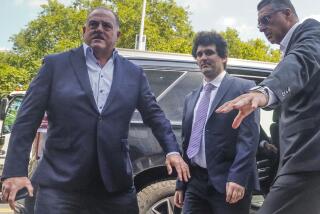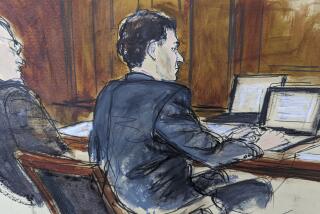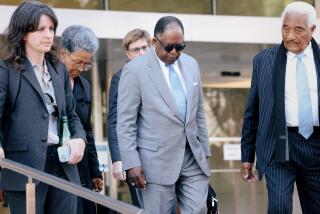Arrogance on trial
- Share via
JURORS FINALLY BEGAN DELIBERATIONS Wednesday in the nation’s latest trial of the century, the criminal case against former Enron executives Jeffrey Skilling and Kenneth Lay. Although charged with multiple counts of conspiracy, fraud and insider trading related to the energy company’s 2001 collapse, the ex-CEOs were really on trial for arrogance -- “extraordinary arrogance,” as one prosecutor called it in her closing argument.
Of course, arrogance is not technically a crime, or else half the CEOs in the country (and more than a few of their underlings) would be on trial. But in complicated cases like Enron’s, it’s what prosecutors often focus on and what that jury may be considering now.
The Enron case has become more than the sum of its criminal-act parts. Because Enron flamed out in such a spectacular way -- it was the largest corporate bankruptcy ever when it folded, wiping out about 4,500 jobs and $70 billion of investors’ money -- it became the poster child for fin de siecle business abuse; its leaders, the faces of corporate greed and dishonesty.
It’s hardly surprising that trial watchers have come to treat the long-awaited verdict as a proxy for the cause of business reform writ large. If Skilling and Lay go down with the ship, the thinking goes, it proves that the government really is looking out for the little guy. If the two men walk, big business has fleeced America once again.
But corporate reform’s ultimate success doesn’t depend on whether Skilling and Lay spend the next 20 years wearing orange jumpsuits. The legacy of Enron-inspired laws like Sarbanes-Oxley is far more important. Given their symbolic importance, however, one might have expected Enron’s former executives to attempt to disprove to the jury the prevailing public view that they are, well, extraordinarily arrogant.
Skilling was at times prickly on the stand. The usually affable Lay, expected to perform more smoothly, tried to contact fellow witnesses inappropriately and snarled at his own attorney. Both men insisted doggedly that they were innocent, victims of short-selling investors and meddling reporters. The government? On a witch hunt. The many colleagues who pleaded guilty, expressed remorse and testified against them? Dupes or opportunists.
Now the fates of Skilling and Lay are in the hands of 12 fatigued jurors in Houston. Their charge is to consider only the evidence in the 28 counts of fraud, conspiracy and insider trading against Skilling and the six counts of fraud and conspiracy against Lay. But it’s unlikely that they will forget all that they have seen and heard in the last 15 weeks. Nor will the rest of us.
More to Read
Inside the business of entertainment
The Wide Shot brings you news, analysis and insights on everything from streaming wars to production — and what it all means for the future.
You may occasionally receive promotional content from the Los Angeles Times.










